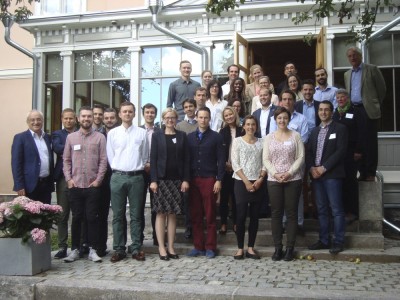
In Europe, young people are turning into an increasingly scarce resource. With the ageing of the population, providing the next generation with an excellent education is becoming more important than ever. In this sense, education isn’t just about the facts and the skills you learn in school, it is also about attitudes and identity.
As an organisation, United Europe is committed to making our continent a good place to live for the next generation. Improving education is certainly part of that. So what better topic for a Young Professionals Seminar? And what better place to have this discussion than Finland with its reputation for outstanding schools?
That’s why, on the last weekend in August 2015, 26 young Europeans representing a total of 20 different nationalities met in Helsinki for an intensive debate on “A Curriculum for the Next Generation.” Participants came from a wide array of professions included a school teacher and a specialist in teachers’ education.
Now, it’s the real economy
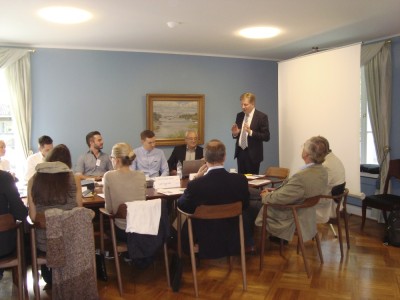
It was Esko Aho, the former Finnish prime minister, who introduced one of the most important topics of the weekend in his opening speech. Digitalisation, he said, represented a great opportunity for Europe, but success would require commitment, resources, skills and the right attitude.
In the recent past, digitalisation had mostly been about entertainment and communications, Esko Aho explained. Then, it was the United States which led the development. Now, as the real economy was being digitalised, Europe could regain the front rank thanks to its long industrial tradition and its wealth of regulatory experience.
Mr. Aho held his speech in a beautiful historic mansion on the outskirts of Helsinki: Munkkiniemi House, a 19th century villa now serving as headquarters to the chairman of KONE OY, Antti Herlin. Kone was among the sponsors of the seminar as was the TT Foundation of the Confederation of Finnish Industries.
“The solution is more Europe”
On this event, United Europe was also supported by the Friedrich Foundation, a German institution committed to fostering education. Many thanks for their help to make this event happen!
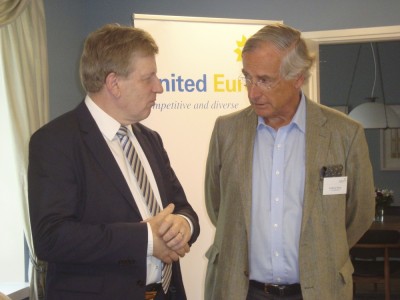
Thanks are also due to Anthony Ruys, a former CEO of Heineken, who again acted as mentor. With his leadership experience and his commitment to the next generation, Thony is hugely important to the Young Professionals Seminars. Of course, United Europe’s Managing Directors Bettina Vestring and Christoph Riess (who in the meantime has left the organisation) were also there.
Back to the programme: A second, short introduction was given by the Chairman of the TT Foundation, Leif Fagernäs. He is a Finnish former diplomat who spoke about the painful, but also invigorating changes that he saw happen in Europe during his life. “Very few people actually want to go back to the fragmented Europe,” Leif Fagernäs said. “The solution is more Europe, not less Europe. For that, we need growth, because economic strength brings political power.”
Short presentations introducing the topic
Martin Schramm from Germany was the first of the young professionals to give a presentation. He spoke on the “World in 2050” and the shift in trading patterns towards the southern hemisphere. If Europe wanted to increase its standard of living, it needed to participate in that development. Europe should use its cultural diversity to forge links to the future centres of economic development.
Next, it was Zuzana Benesova’s turn to speak on her generation’s mind-set and the need to be flexible. “There shouldn’t be a stigma for failure in the job,” this young Czech said. “Otherwise there won’t be enough entrepreneurial spirit.” Lampros Makris added his view of the particular challenges faced by his generation in a crisis country like his native Greece. “The crisis creates opportunities, but not for all people, not for all times and not for all circumstances,” he said.
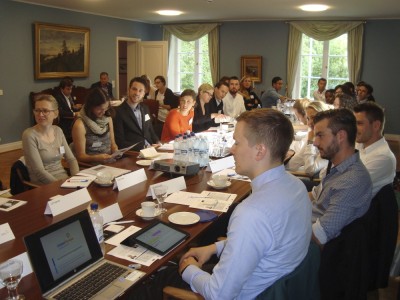
The next bloc of short presentations focused on the weaknesses of the current educational system. Otto Ruys, an entrepreneur from the Netherlands, spoke about what he didn’t learn in business school. The educational system had to be changed in order to produce thinkers and problem solvers, and not copying and reproducing machines.
Salla Pöyry, an economist from Finland, looked at vocational training which has proven inflexible in many countries. Instead of training for yesterday’s jobs, vocational education needed to be much quicker and more effective about helping people develop the skills needed in the workplace in the future.
How to regain digital leadership
Mark Barber then pointed out that waste wasn’t limited to vocational training. In his native Britain, a staggering 47 percent of recent graduates were doing jobs that didn’t need a degree, he said. A private education system charging considerable fees to students actually helped them make good choices about the career they wanted to train for.

The first day of the seminar concluded with a presentation from Mika Ruokonen, Director of Recruitment at the Finnish media company Sanoma. Mika spoke about Finland’s economic woes, the decline of Nokia and the euro crisis which put the country deeply into recession.
“How to regain digital leadership?,” Mika asked. “Focus more on excellence. Choose a few big bets and try to achieve world leadership there. Also, develop a new leadership culture that puts more emphasis on team work and creativity. Digital leadership really needs a mind-set shift.”
Dinner on this first night in Helsinki was a wonderful experience. Antti Herlin invited not only the seminar participants, but also several young Finnish entrepreneurs to his farm out in the country side. The barn at Thorsvik estate provided a wonderfully convivial setting, and the steaks from the farm were sublime.
What employers will be looking for
Saturday morning, everybody was back at work at Munkkiniemi House. Participants began the day listening to Kerttu Tuomas, Executive Vice President at KONE for human resources, explain what employers will look for in the future. “Skills, values, attitudes, experience- what will matter most in the workplace?”
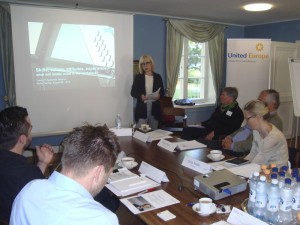
Kerttu Tuomas stressed the enormous change in the workplace due to modern communications as well as the importance of corporate culture. “What matters most are the ability to get things done, the learning ability and the ability to communicate and work with different kinds of people and different generations,” she concluded. “You have to be able to make sense of complexity.”
Saturday’s first bloc of short presentations focused on policy choices. Dominik Pförringer, a young German doctor and business specialist, made the beginning. His topic was the issue of justice between generations. What part of society’s scarce resources should go to education, how much to the increasingly expensive healthcare for the elderly?
“Public policy problems are becoming increasingly wicked”
June Sarpong, who was born to Ghanaian immigrants to England, spoke about a new phase in the struggle for equal rights which would benefit men as well as women. “The way Europe is going to compete in the world is by empowering its women. That is not a zero sum game,” June concluded.
Next was Külli Sarapuu from Estonia who spoke about the skills that government officials will need to deal with increasingly complex and difficult public policy problems. Ane Serrano Simon focused on the millennials and their attitude towards mobility and the world. Ivo Bochev caused a particularly lively debate with his proposals for keeping highly-skilled people in Europe.
In the next bloc of short contributions, Rüdiger Kurz explained the German apprenticeship system and how this could help reduce youth unemployment elsewhere in the EU. Christoph Korittke spoke about the creative potential of Europe’s diversity. “You need to be interested in the differences – that’s where new ideas hide,” he said. But in order to make this work, synergy was needed, and this in turn needed a common language, space, curiosity and an attitude allowing for failure.
Schoolkids today
Lorenzo Kihlgren Grandi stressed the importance of fostering Europe’s cultural and creative industries with their spill over effects on innovation. Next, Anne-Marie Grossmann gave a presentation on the nature of entrepreneurship. “We need individuals who have ideas and we need to create opportunities for these individuals,” she said.
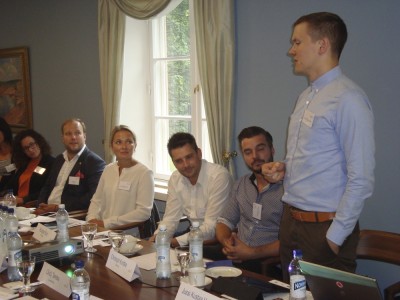
Yet how can you discuss a curriculum for the next generation without actually looking at school kids and what they are like? With a short film about an experiment on social behaviour at the KONE Global youth camp, Jussi Herlin captivated everybody’s attention. For half a day, 150 kids were pushed into role-playing in order to really feel the effects of income inequality. “We want to teach them empathy, communications skills and critical thinking,” Jussi said.
In ever more countries, parents now have a choice where they send their children to school. As a result, said Louise Edlund, a math and geography teacher from Sweden, students now need to be treated as customers. She spoke of a very different generation growing up today: students are better about seeking knowledge by themselves and are used to cooperation. Yet they are sometimes short of factual knowledge and lack the ability to understand that setbacks are a part of learning.
Good teachers cannot be replaced
Edite Sarva, a Latvian engaged in teachers’ education, pointed out the weaknesses of the traditional school system and the usefulness of the project method to bring about more comprehensive lessons. Her contribution provided a perfect transition to the last speaker of this seminar, Dominik Dresel, who had been put forward by the Friedrich Foundation as a specialist in e-learning.
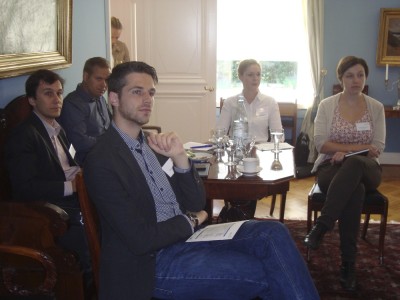
“Our education is a product of the industrial age,” Dominik said. “It has been changing, but at a pace that is too slow.” The new technologies provided some very interesting and useful developments, he said, explaining some new trends like the flipped classroom, the use of digital devices instead of traditional textbooks and the benefits of adaptive learning software.
Still, none of this could work without good teachers, Dominik added. “Any teacher who can be replaced by technology deserves to be.”
Better methods are good, of course, but what aim should they follow? What will the next generation of Europeans need to learn in order for our societies to do well? Conall Gribben made the start on this last series of presentations by explaining the tech literacy paradox: young people use digital technology without understanding it. The UK is one of the countries trying to address this by introducing coding in elementary schools, but finds it difficult to provide trained teachers and the necessary infrastructure.
Focus on the milestones
Mateusz Golak focused on the importance of teaching European law; Vlad Voiculescu added an input on health care. Finally, Alba Royuela and Cindy Tereba gave two very different takes on the role of languages in the school curricula of their countries. In Spain, Alba said, people don’t speak much English, but that’s not something they worry about. One out of three Spaniards has never even been abroad.
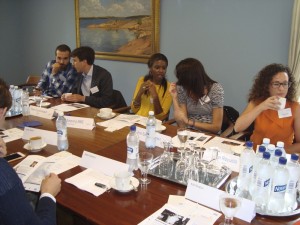
In contrast, Cindy Tereba explained how high school graduates in Luxemburg speak three to five languages by the time that they finish school. “Luxemburg does not have a far right party or a far right movement despite nearly 50 percent of its population being foreigners” she added.
In the following contribution, Johanna Atzmannstorfer proposed rethinking the teaching of history in schools: Instead of thinking of history in national terms, teachers should focus on milestones of history like the Renaissance that have left a mark everywhere in Europe. This could contribute enormously to the emergence of a European identity.
Similarly, Yann Couronneaud added, promoting our cultural heritage could help shape awareness of our common identity. “The foundations of Europe lie in its culture, yet culture was only included in the European treaties in 1992,” he said.
Conclusions
With so much input from so many sources and perspectives, it was time to try and draw some conclusions. Participants split up into three working groups that were given the identical task: what should the curriculum for the next generation comprise of?
Interestingly (and encouragingly), all three groups came up with quite similar conclusions. All three focused on mentality, policy and education as the three main levers to ensure a good future for the next generation. Ideas ranged from fostering exchange programmes for schools and teachers to setting up European sports events and creating a travel and museum card for young people.
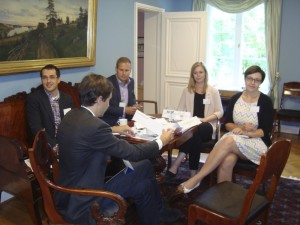
Add to that better policies on economic legislation, the harmonisation of labour law and a common vision for school kids in Europe: what do we want them to be like when they finish school?
“Let’s tackle it”
Finally, when all three working groups had presented their results, Dominik Pförringer did an outstanding job in pulling their results together and combining them into a list of conclusions. Please have a look here!
It was Shilei Zhang, a young Chinese who had grown up in Finland, who then gave the last short presentation of this Young Professionals Seminar. Shilei, with his experience of Europe and of China, gave good overall marks to the European education systems. But what was missing, was a sense of optimism, he said. “Europe is a good place in comparison with very many other places in the world. The main obstacle to change is the lack of optimism”.
In his concluding remarks, Thony Ruys agreed profoundly with Shilei. “Europe is much better than we think – let’s work together on the branding of Europe,” he said. “We need a sense of urgency, and we need optimism: Let’s tackle it. Let’s do it.”


